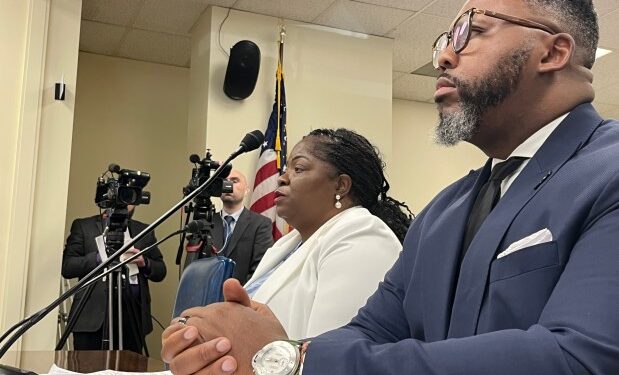SPRINGFIELD — Six years after Chicago police officers wrongfully searched the home of social worker Anjanette Young, she told state lawmakers about the trauma she experienced in testimony on legislation that would essentially bar no-knock search warrants in the state.
“I pray that none of you never have that experience because my story now includes experiencing PTSD, depression and fear of the very people who were sworn to protect and serve,” Young told Illinois lawmakers on Tuesday. “My story now includes the sheer panic when a police officer pulls me over for a routine stop. These are not normal interactions that any resident should have, however, these are real life events that happened to me since 2019.”
Young appeared before the House Judiciary Criminal Committee to testify on a legislative proposal that would mostly ban no-knock warrants by police in Illinois and put more regulations on law enforcement when executing search warrants within the state. The measure dubbed the Anjanette Young Act passed through the committee on an 8-5 vote, but it’s likely to be subject to more negotiations between lawmakers and law enforcement before it goes any further.
No-knock warrants have been restricted in states including Florida and Kentucky, which enacted its law following the 2020 fatal shooting of Breonna Taylor by police in Louisville who rammed in a door to her apartment to execute a search warrant. During President Joe Biden’s administration, Congress tried to restrict the practice through its introduction of the George Floyd Justice in Policing Act, but the bill never passed.
Rep. Kam Buckner, the main sponsor of the Illinois bill, said the legislation is supposed to strike a balance between protecting the public and protecting law enforcement.
“I’ve had and will continue to have conversations with law enforcement professionals throughout Illinois. I understand the real risk that they face every day in the line of duty,” the Chicago Democrat said. “(The bill) is not about tying their hands. It’s about ensuring clarity, accountability, and safety in a high risk situation so that officers are not put in avoidable harm’s way, and innocent people are not placed in the fear of danger.”
Acting on bad information, about a dozen Chicago police officers used a no-knock warrant to enter Young’s Near West Side home on Feb. 21, 2019 in search of a man believed to have an illegal gun. Police body-camera footage of the raid showed officers handcuffed Young, who was naked when police arrived, as she repeatedly told them that they were in the wrong place. Shortly after entering her home, one of the officers draped her with a blanket.
Video footage of the raid, first reported by WBBM-Ch. 2, prompted criticism of the CPD’s search warrant policy, which has since undergone changes. Young filed a lawsuit against the city that has since been settled for $2.9 million. The case was also a low point for former Chicago Mayor Lori Lightfoot whose administration came under fire for fighting in court to block Ch. 2 from airing the body camera footage.
In the six years since the raid, the Chicago City Council has considered an ordinance reforming the search warrant process but has not taken action.
The Illinois legislation would ban no-knock warrants unless there’s a threat to the officers or other people. In addition, a search warrant would not be issued when the only offense alleged is possession of narcotics, unless there’s reason to believe that the controlled substance is tied to manufacturing, distributing or selling the drugs.
Before a warrant is issued, an officer must attest that the request for it is not based on information from informants who have provided false information that has led to negative raids in the past, the bill states. It also says officers must be clearly identified with their badge or in uniform during search warrants.
The bill would also prohibit officers from pointing a gun at anyone under 18 while executing search warrants unless there’s an imminent threat. And during the execution of a warrant, officers are prohibited from handcuffing or restraining any child unless they present an immediate threat of harm to themselves or someone else.
There would also need to be a paramedic or emergency medical technician in the vicinity on standby to provide medical aid, if necessary. The legislation would also require search warrants to be executed between 9 a.m. and 7 p.m. unless a judge grants an exception. Also, in counties with 90,000 or more residents, only SWAT teams or trained special response teams can execute high-risk search warrants.
“This is about every family whose door has ever been kicked in, every child who has ever been terrorized, every innocent person that has been treated like a criminal because of reckless and unaccountable policing,” Young said at Tuesday’s hearing. “We cannot continue to put people at risk. We cannot continue to kick this can down the road. It’s been six years for me and I’ve been fighting for some real policy change, but it’s been more than six years for other families.”

But some lawmakers from both parties acknowledged that there are unresolved issues with the bill.
Rep. Angelica Guerrero-Cuellar, a Chicago Democrat whose husband is a Chicago police officer, was one of the five lawmakers who voted against the bill during the hearing. Afterwards, she told the Tribune she was aware of some of the law enforcement opposition to the bill and doesn’t want to have to come back to amend the measure if the General Assembly passes it.
Rep. Dennis Tipsword, a Republican from Metamora who has also worked in law enforcement, questioned the 9 a.m.-to-7 p.m. timeframe, and said the bill “needs a lot of attention.”
“When we execute search warrants, we’re looking out not only for our safety but obviously anybody in that house, in the neighborhood,” he said during the hearing. “Nine a.m. to 7 p.m., when we get into those afternoon hours, now we’ve got kids on the street, extra traffic in the neighborhoods where response vehicles may have to come down. Just a lot more folks in the area that could be in jeopardy of something happening as opposed to that early morning, under the cover-of-darkness-type search warrant.”
He also took issue with the provision about officers being readily identifiable because there could be times when officers may need to go undercover during warrant executions.
Ed Sullivan, who represents the Illinois State Rifle Association, said the group supports the bill because the concept of no-knock warrants could create dangerous interactions between police and residents who carry guns in their homes.
“The difference between Ms. Young and our members, our members are armed,” he said. “Our members understand how to shoot. And our members generally are wary of people in the neighborhood, so they start off on a different place. But our members are law-abiding citizens, so they wouldn’t really understand why someone knocked their door down.”
Young sought to make it clear during her testimony that victims of bad searches like herself aren’t just after settlement money.
“A check cannot restore our dignity,” said Young. “Let me be clear: We don’t want the money. We never wanted the money. We want to feel safe in our homes. We want to trust that law enforcement will do their jobs without violating our rights.”







